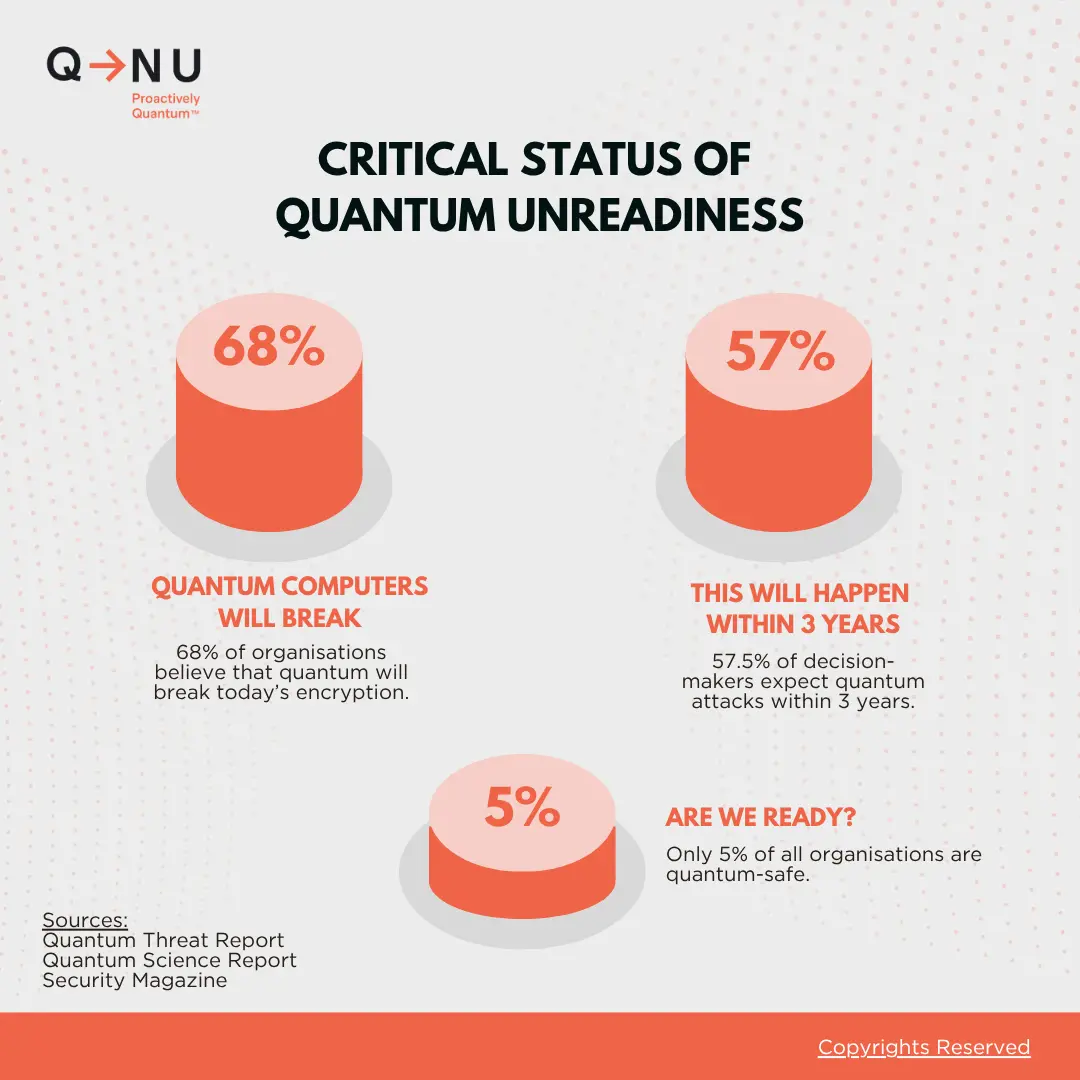Are You Ready to Witness the Future of Data Security?
Platform
©2026 QuNu Labs Private Limited, All Rights Reserved.

Quantum unreadiness has become an infamous buzzword in the field of cybersecurity. As quantum computing, along with its security threats, is emerging, quantum unreadiness is a way to downfall. From enterprises to government entities, from communication to collaboration, and from data protection to data transmission, quantum security is inevitable, as it helps organisations become immune to cyberattacks.
The cost of unreadiness is not widely acknowledged or understood; the awareness of quantum threats is also limited. Let’s unearth and analyse the impact of being unprepared for the quantum era.
Definition: Quantum unreadiness (n) is a state of cybersecurity when an organisation is unprepared, unplanned and unequipped for the impacts of quantum computing and quantum threats.

To be quantum-ready is the only way out. It is not a question of ‘whether you are doing it or not.’ Instead, it is a question of ‘when you are doing it.’
Quantum unreadiness is similar to digital data security suicide. With every organisation having sufficient time to equip their digital infrastructure, insufficient preparation is not a strategic option but a willing surrender.
Organisations don’t risk their sensitive data. It occurs due to a severe lack of awareness about what it entails. Here is a scenario of what it would be like in the post-quantum era following a cyberattack.
If breached, organisations face severe reputational damage along with data loss. The backlash from customers, partners and stakeholders becomes a hurdle for the brand.
With a robust security infrastructure, technology will enable them to scale up more quickly. With vulnerable systems and processes, entities and enterprises lose their position of superiority and become susceptible to attacks.
Leaders should focus on strategies to meet market needs and expand their business rather than fire-fighting cyberattacks. Scaffoldings are not shields, just like yesterday’s security encryptions are not.
Business is for customers. And for growth. Surrendering to cyberattacks is not even a distant thought. However, not taking action or delaying action will lead to surrendering instead of skyrocketing to greater heights in revenue.
Cyber attackers have started downloading the data, although they can’t decrypt it yet. They will continue to harvest the data and then go into hiding. Once they have access to quantum computers, they will start haunting by committing regular breaches with the data they have already taken from organisations.
With timely action and by becoming quantum-safe, organisations can avoid such untoward situations.
Last year. Or… Now.
Many IT experts believe it is already too late to initiate quantum security solutions, given the numerous advancements and launches in quantum computing.
It is just a matter of time. Once Q-Day hits, there is no going back. Hence, it is highly recommended to add quantum cryptography to the pipeline and initiate it as a critical imperative.
There are just three simple steps to become quantum-ready for any type of organisation.
Complete a detailed audit of your organisation’s data and risk posture.
Crypto agility refers to the ability of an organisation to transition rapidly from one type of encryption to another. It adds flexibility to adopt any advanced encryption methods, such as quantum.
Once your organisation is crypto-agile, it’s time to scale it up with quantum security solutions.
Partner with the world’s leading quantum security partner, QNu, for end-to-end quantum-safe encryption.
Quantum applies to all types of organisations, irrespective of size and location. Any entity that uses computers, networks, and the internet and that handles sensitive information can and should adopt futuristic encryption.
Migrating from traditional cryptography to quantum cryptography is a time-consuming process. It involves various stakeholders, resources, and unprecedented delays. So, it is always recommended to initiate the process as early as possible to be threat-free in the quantum era.
QNu Labs is the best quantum security company, providing end-to-end quantum solutions. QNu offers both hardware and software solutions for quantum cybersecurity, ensuring faster integration without disrupting the existing infrastructure.